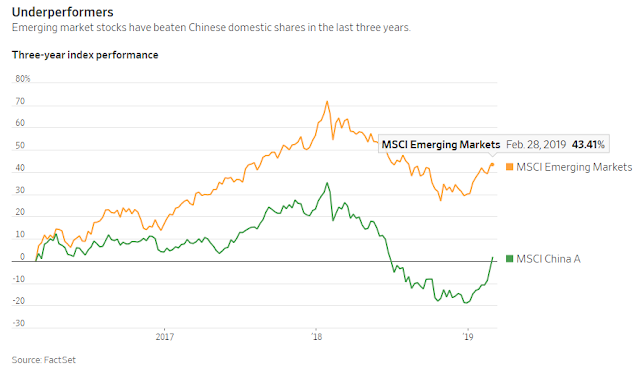China’s Stock Market Isn’t Too Big to Ignore
MSCI is raising the portion of China A-shares in its EM index. That doesn’t give investors carte blanche to snap them up.
By Mike Bird
MSCI MSCI 2.20%▲ has decided to quadruple the weighting of Chinese stocks included in its flagship Emerging Markets Index. Investors shouldn’t take this as an invitation to pile into China without thinking.
The index industry giant’s original 2017 move to include some so-called A-shares came with plenty of fanfare. In practice, emerging markets investors who benchmark their performance against MSCI’s index were safely able to ignore the move. Initial weightings meant Chinese shares made up less than 1% of the EM index, slightly below the share of Poland: Whether domestic Chinese shares boomed or crashed has hardly mattered to the index’s performance.
Studied ignorance will be a less viable option from now on. The changed weighting of Chinese stocks in the emerging markets index will bring their share of it to around 3.3% by November 2019, giving it a share somewhere between Mexico’s and Russia’s.
Index provider MSCI said it would more than quadruple the weighting of mainland Chinese companies in an influential global benchmark.

Index provider MSCI said it would more than quadruple the weighting of mainland Chinese companies in an influential global benchmark. Photo: thomas white/Reuters
As that share rises, Chinese stocks will become harder for conservative asset allocators to avoid. Managers who try not to deviate far from their performance index—known as benchmark huggers—will end up buying increasing amounts of A-shares.
But asset managers lazily sticking to an index while charging their clients steep fees shouldn’t get a pass for making poor investment decisions. Research published last year by MSCI itself showed that active managers in emerging markets have greater potential to outperform indexes, in part because the inefficiency of those countries’ capital markets puts a higher premium on stock picking. The logic for index-hugging in developed markets is stronger: there at least, actively managed funds have overwhelmingly underperformed their passive peers over time.
By admitting more shares from places such as China into their indexes, providers like MSCI are simply judging that the way their markets operate meets minimum standards. The decision reveals nothing about whether they stocks are a good buy. The fact that MSCI’s A-Shares Index has underperformed the broader EM index by almost 30% over the past three years should give pause to those who think Chinese stocks simply track the asset class.
If investors want to make a greater allocation to China, they should find a better pretext than MSCI’s decision.

0 comments:
Publicar un comentario